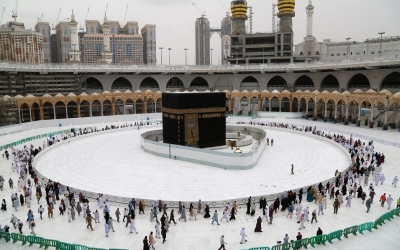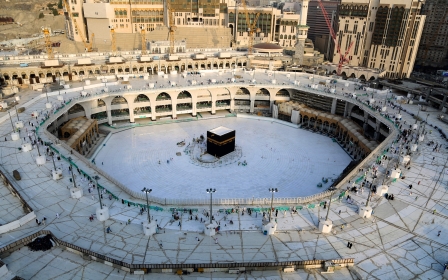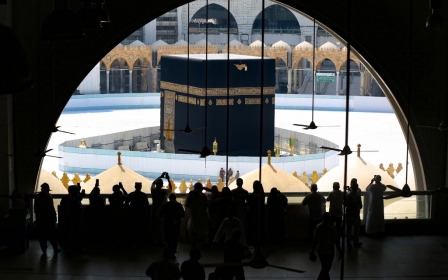UK Hajj pilgrims left 'inconsolable' after ban on international worshippers
Aksa Khan had her heart set on performing the Hajj next month.
The solicitor made the intention to go some three years ago and spent the last few months making a host of preparations along with her husband.
Some of the plans included making arrangements for her four children and paying the more than $20,000 needed for the pilgrimage, but most importantly, there was planning for the spiritual journey.
But after Saudi Arabia announced on Monday that it would be barring all international pilgrims from this year's pilgrimage, Khan said she felt dejected by the decision.
"I was inconsolable when I read the announcement that [the] Hajj was cancelled," she told Middle East Eye.
New MEE newsletter: Jerusalem Dispatch
Sign up to get the latest insights and analysis on Israel-Palestine, alongside Turkey Unpacked and other MEE newsletters
"This year will be the last Hajj that will take place during the summer holidays for the children, and [this] could mean us having to wait a few years before we are able to go again.
"We had been preparing for this moment spiritually, psychologically and physically and thought 2020 would be our year."
Khan was part of a group of 100 pilgrims who were initially allowed to make this year's Hajj pilgrimage from the United Kingdom.
But on Tuesday, Saudi Arabia announced that it would be holding a "limited" Hajj with only 1000 pilgrims who are working and living inside the kingdom able to perform the ritual that traces its roots to the biblical patriarch Abraham.
It is a stark contrast to the 2.5 million pilgrims it usually attracts annually from across the world.
Talha Ghannam, a tech entrepreneur from Birmingham, was part of Khan's group and had planned to make the journey for the first time.
The cancellation means delaying an important component of his religion that he has dreamt of doing for years.
"Previous circumstances did not allow me to fulfil this obligation, and in a selfish way, now would have been the most convenient time," said Ghannam.
"The Hajj would have been a chance to reconnect with God, but we have been stuck in limbo over whether to prepare or not. The only solace we have is gaining some certainty."
Massive blow for smaller agencies
Earlier this year, following a spike in Covid-19 cases, Riyadh made the decision to stop the Umrah, the lesser pilgrimage made by Muslims to Mecca.
Saudi Arabia imposed lockdowns across the kingdom as it battled to contain the coronavirus, fueling months of speculation over whether Riyadh would cancel the Hajj.
The Kingdom has since eased the lockdown and issued a set of guidelines for its plan of a "limited" Hajj.
Months of speculation, however, has made things uncertain for travel agencies specialising in the pilgrimage.
Abdul Sami, a spokesperson for the GA Travel Centre, a Hajj agency based in East London, said the announcement would have an immense impact on tour groups.
Like most British businesses, the GA Travel Centre has been using the UK government's financial aid schemes to furlough staff and support them during the pandemic.
Sami believes the cancellations will be a massive financial blow to smaller companies and force agencies to increase the price for Hajj next year to make up for this year's losses.
"The majority of travel agents will be impacted. Hajj season is the most profitable time of year for agencies in Britain," Sami said.
"Umrah season is not as profitable. Profits from the Hajj season is where they make the most money and sets them up for the rest of the year.
"Most companies will have no choice but to increase the price for Hajj packages to make up for a loss in this year's projects."
Prior to Riyadh's announcement, several countries with large Muslim populations made the decision to not send their citizens to the Hajj.
When asked whether he would have gone if Saudi Arabia had relaxed rules, Sami instantly replied "yes".
"Saudi Arabia has experience in dealing with outbreaks and made steps that were approved by the World Health Organisation," he said.
"Countries with large quotas of attendees like Indonesia and Malaysia cancelling also mean that half of the annual Hajj pilgrims would not be there.
"GA Travel's Hajj group would stick together throughout the Hajj if we were allowed to go and formed a support bubble to protect ourselves from Covid-19."
Khan and Ghannam echoed Sami's enthusiasm and said that the Hajj was a "once in a lifetime journey", but were worried whether they could be a risk to other pilgrims if they decided to go.
For now, both Khan and Ghannam have been offered the option to reserve a place on next year's Hajj or request a full refund.
Ghannam said he is still deciding whether or not he will reserve a place in 2021, but for Khan, her children's exams will mean her having to stay in Britain to help them prepare.
"The Hajj getting cancelled has been a major heartbreak as a family," said Khan.
"It's left us mortified and I don't know when I'll be able to go again."
Middle East Eye delivers independent and unrivalled coverage and analysis of the Middle East, North Africa and beyond. To learn more about republishing this content and the associated fees, please fill out this form. More about MEE can be found here.







